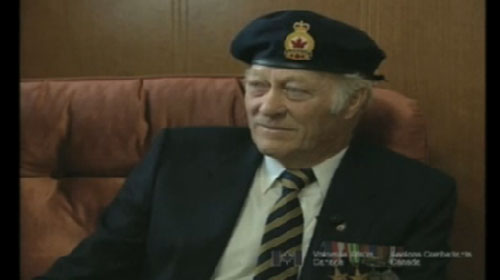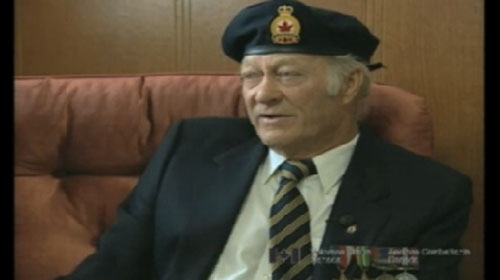There was a trench in the airport like,
we had left a channel
but there was no cover on this here,
for the water to run out to the sea.
And there was no cover on there so the Japs
came in with the plane,
taxied in there and when they ran into that damn
ditch, you know, boom the tail wing come up and
this Jap got out of that plane,
nobody got killed or nothing but they got out
of the plane and this one says,
kept pointing his finger at me,
"Hoi, hoi, hoi!!" Kept pointing at me all the time,
you know. I thought what the hell is
he pointing at me for, you know.
I didn't have nothing to do with that, you know.
He said I laughed, you know,
told his interpreter. "He laughed." So they
come over to me and started slapping me
around and this Jap officer took a bamboo
pole and this guy slapping me and all of a
sudden this guy steps back and I thought,
wondering why he is quitting now, you know,
why he's quitting so quick.
They usually give it you for a half hour or
so until they're pooped out or something,
you know. I wonder why he's quitting.
So then this Jap, he's got a bamboo pole
seven or eight feet long and he winds up and
gives me right across the neck, you know,
like hit me on this side and knocked
this vertebrae right out on this side over here.
I went right down on my knees, eh,
"Wham!" I was kind of dumb too, I guess,
I heard that wind blowing on the end
of that damn hollow pipe, you know, and
I should have, I just pulled my neck down,
you know, I should have dropped myself on
the ground, I'd been okay maybe.
But he hit me there, wham, and Jesus,
I couldn't even see straight, nothing,
the ground was going,
my guts were going and I thought,
Christ now I've had it,
you know. I'm thinking to myself,
all this crap that's going through your head,
you know, like this is it, you know.
And so then he, instead of kicking me,
then he'd boot you eh!
And instead of booting me he took
the pole and drove it in my back and
I just went flat out like that, passed right out,
Jesus that hurt, you know.
Jumped over the bones over my back, you know,
I guess so, holy Christ did that hurt!
I just went, I blacked right out,
boom and down I went and stayed.
I don't know how I got to the camp or nothing.
They took me to the camp and then
the next day I got up and I was still
groggy like, you know,
like this damn thing was pinching on a nerve and
I didn't know it, you know,
what it was doing, what was wrong.
And I couldn't get up,
couldn't get going good
so I couldn't use my arms.
I couldn't feed myself so this guy was
feeding me and he put his arm around my
shoulder and went to reach to the right like that
and when he did it turned me and something went
bang in my back, you know, and
when it went bang then I felt better.
It jumped back in or something.
It went back in place or some damn thing
because I got so I could get on my feet right,
you know. I was getting up but
I couldn't get going right and I finally got
going and then I figured now that's all over with,
you know, but no, the next day when they
went to go to work they told me to stay there.
And they took me over to a wall and they put a dot
where my nose came and
a ring around it, you know,
I had my hands in the air and
I had my nose on that dot and every time,
they change the guards every hour,
a different guard would come.
So I stood there a whole hour and never moved.
So then when, just before he leaves he
would hit me in the back of the face and
drive my face into the bricks, bungo, you know.
So then, when he'd leave another
guy comes there. So one of them there,
he kept poking me with a bayonet a little bit,
you know, yes sir! I never thought
I would ever get out but I used to try and
kid myself that I would, you know.
I never thought I would get out.
I thought, the hell, we've had it, you know.
Interviewer: Did they tell you that you
were going to be killed? The Japanese,
did they tell you that you were...
They told me, they wanted me to sign a paper
after they beat me up there so bad and I
couldn't hardly see, only with this one eye,
my whole face was covered right up,
no eyes, no nothing and my nose was busted,
I would be looking over at that floor,
they broke my nose on that floor and I...
Interviewer: This is on the wall?
Ya, on the cement and I took,
I got a little piece, I was still working like that
but I was bleeding in my throat so bad that
I was choking on blood and spitting it out and
I got a little piece of stick like that
off a green tree and I smuggled it into the camp,
had to even smuggle a little piece of
damn stick like that in there and
the windows, there was a lot of broken windows
in there so you'd take a piece of
broken glass and you'd break it again, you know,
and then there's a sharp edge on it then and
then you could scrape the bark off of that and
I made two plugs. And I set my nose like that and
I pushed those plugs up my nose and moved the
bones around, you know, and the water was just
a running down, dripping off my chin and
then I got one on each side and then I
would have to take them out about
every 10 or 15 minutes and
scrape them off with my thumbnail and lick them,
I didn't have no vaseline, no oil,
no nothing to put on there.
If I didn't do that they would grow in there,
start growing in there, pull your damn nose out.
So I kept working this and finally got it.











